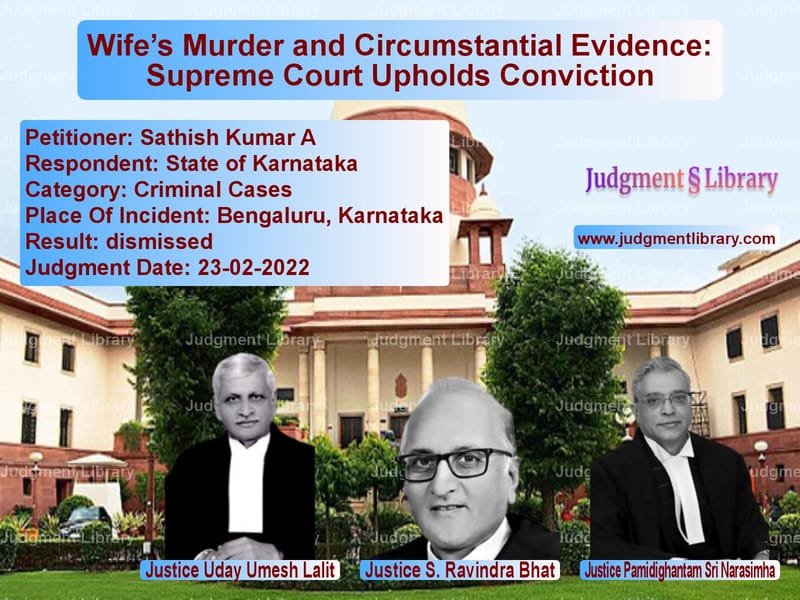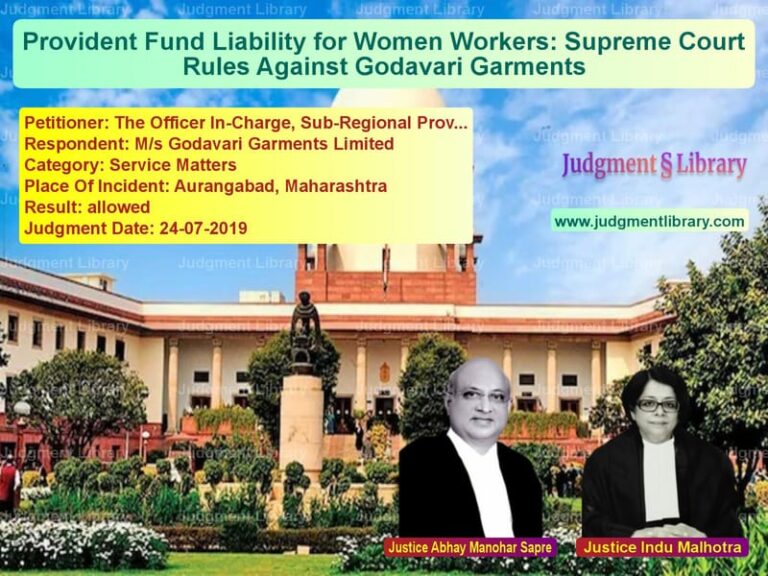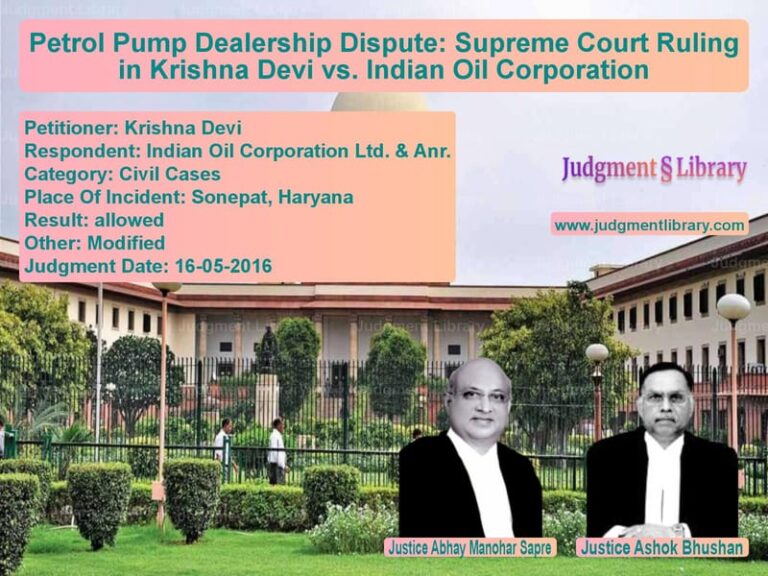Wife’s Murder and Circumstantial Evidence: Supreme Court Upholds Conviction
The Supreme Court of India recently delivered a significant ruling in the case of Sathish Kumar A vs. State of Karnataka, concerning the brutal murder of the appellant’s wife and the role of circumstantial evidence in establishing guilt. The case involved an intricate web of lies, misdirection, and forensic analysis that ultimately led to the conviction of the accused.
Background of the Case
Sathish Kumar A was charged with the murder of his wife, Priyanka Gupta, in the early hours of 10.08.2010. The prosecution alleged that after committing the crime, he attempted to stage the scene to make it look like a robbery gone wrong. The appellant was convicted under Sections 302 (murder) and 201 (destruction of evidence) of the Indian Penal Code (IPC) and was sentenced to life imprisonment and five years of rigorous imprisonment, respectively.
The prosecution’s case relied entirely on circumstantial evidence, as there were no direct witnesses to the crime. The appellant challenged the verdict before the Karnataka High Court, which upheld the trial court’s conviction. The matter was then brought before the Supreme Court.
Petitioner’s Arguments
- The appellant argued that there was no direct evidence linking him to the crime.
- He claimed that he was out jogging with his friend (PW-2) at the time of the murder.
- He contended that the presence of intruders, as mentioned in his complaint, could not be ruled out.
- The defense highlighted that the call records and forensic evidence were misinterpreted by the prosecution.
Respondent’s Arguments
- The prosecution presented a detailed sequence of circumstantial evidence proving the appellant’s involvement.
- Call records showed inconsistencies in the appellant’s statements about when he received a call from his wife.
- The appellant’s claim that he was jogging in sports shoes was contradicted by the recovery of bloodstained sports shoes from his home.
- The manner in which the deceased was tied to a chair was similar to an incident the appellant had enacted earlier as a surprise gesture, demonstrating premeditation.
Supreme Court’s Judgment
The Supreme Court upheld the conviction, emphasizing the strength of the circumstantial evidence. The Court applied the five key principles from Sharad Birdhichand Sarda v. State of Maharashtra (1984), commonly known as the “Panchsheel” of circumstantial evidence:
- The circumstances must be fully established.
- The established facts should be consistent only with the guilt of the accused.
- The circumstances should be conclusive in nature.
- They must exclude every possible hypothesis except the accused’s guilt.
- There must be a complete chain of evidence ruling out any doubt.
Key Excerpts from the Supreme Court Judgment
The Court noted:
“The circumstances stated hereinabove were not only proved individually but they formed a clear chain which was consistent only with the hypothesis of the guilt of the appellant.”
Regarding the call records, the Court stated:
“The call from the mobile of the deceased was received much before the appellant had reached the house of PW2 but an impression was sought to be created that the deceased had called when the appellant and PW2 were at the jogging track.”
On the discovery of bloodstained shoes, the Court observed:
“The fact that the appellant was on the jogging track in black leather shoes while his sports shoes were at the residence and had bloodstains was a very crucial and relevant circumstance, for which no explanation was forthcoming from the appellant.”
Final Verdict
The Supreme Court dismissed the appeal, confirming the life sentence imposed by the lower courts.
Conclusion: Implications of the Judgment
This ruling reinforces the evidentiary value of circumstantial evidence in criminal cases. Key takeaways include:
- Circumstantial evidence, when forming a complete and conclusive chain, is sufficient to establish guilt beyond a reasonable doubt.
- Inconsistencies in an accused’s statements and forensic findings can play a crucial role in criminal convictions.
- The judgment upholds the principle that appellate courts should be cautious in interfering with concurrent findings of fact unless there is a miscarriage of justice.
This case serves as a precedent for evaluating circumstantial evidence in homicide cases, ensuring that justice is served even in the absence of direct eyewitness testimony.
Petitioner Name: Sathish Kumar A.Respondent Name: State of Karnataka.Judgment By: Justice Uday Umesh Lalit, Justice S. Ravindra Bhat, Justice Pamidighantam Sri Narasimha.Place Of Incident: Bengaluru, Karnataka.Judgment Date: 23-02-2022.
Don’t miss out on the full details! Download the complete judgment in PDF format below and gain valuable insights instantly!
Download Judgment: sathish-kumar-a-vs-state-of-karnataka-supreme-court-of-india-judgment-dated-23-02-2022.pdf
Directly Download Judgment: Directly download this Judgment
See all petitions in Murder Cases
See all petitions in Attempt to Murder Cases
See all petitions in Fraud and Forgery
See all petitions in Theft and Robbery Cases
See all petitions in Extortion and Blackmail
See all petitions in Judgment by Uday Umesh Lalit
See all petitions in Judgment by S Ravindra Bhat
See all petitions in Judgment by P.S. Narasimha
See all petitions in dismissed
See all petitions in supreme court of India judgments February 2022
See all petitions in 2022 judgments
See all posts in Criminal Cases Category
See all allowed petitions in Criminal Cases Category
See all Dismissed petitions in Criminal Cases Category
See all partially allowed petitions in Criminal Cases Category







